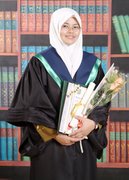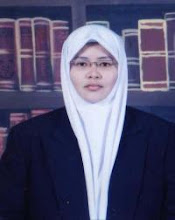
Realising women’s rights in Malaysia
© UNICEF Malaysia/2007/Nadchatram
Universiti Kebangsaan Malaysia’s Vice Chancellor Professor Datuk Dr Sharifah Hapsah Syed Hassan Shahabuddin was reminded by Malaysia’s first Prime Minister of her duty to “take care of this nation as a mother, wife, intellectual and patriot.”
Malaysian women share their voices with UNICEF to mark the country launch of The State of the World’s Children (SOWC) 2007 report on International Women's Day.
Themed “Women and Children – The Double Dividend of Gender Equality”, the SOWC 2007 examines the discrimination and disempowerment women face throughout their lives – and outlines what must be done to eliminate gender discrimination and empower women and girls.
KUALA LUMPUR, March 2007 - In the spacious office of Universiti Kebangsaan Malaysia’s (UKM) Vice Chancellor Professor Datuk Dr Sharifah Hapsah Syed Hassan Shahabuddin is an inspiring message penned in 1995 from the first Prime Minister of Malaysia, Tunku Abdul Rahman Putra Al-Haj, affectionately known as Tunku.
In his stirring message, Tunku had reminded Professor Dr Sharifah of her duty to “take care of this nation as a mother, wife, intellectual and patriot.” Suffice to say, the Professor had not let Tunku down as she worked her way through life to become vice-chancellor of one of the country’s premier institutions of higher education. Famously quoted to be only the second female vice-chancellor in Malaysia, the appointment is more a testimony of Professor Dr. Sharifah’s ability and experiences in a field that has so far been dominated by men.
In her late 50s now, Professor Dr Sharifah is renowned for her advocacy of women’s rights, when it was a less pressing cause in the nation, to the co-founding of the Malaysian AIDS Council in 1992. Imbued with a dry wit and warm charm, she has successfully married her education and professionalism with her intrinsic worth as a woman. In the course of this struggle, Professor Dr. Sharifah has carried the expectations that came with her rise with a strong personal sense of mission.
Meeting women’s needs
Recalling her involvement with the National Council of Women’s Organisations (NCWO) and other non-governmental organisations while serving as a lecturer in the seventies, she explains with modest pride how she helped move forward the Persatuan Siswazah Malaysia (Women’s Graduate Association).
“When I was with the University Malaysia’s Faculty of Medicine, I was concerned about the staff and students who were also mothers. Who would take care of their children? I empathised with them as I too was a young mother at that time,” she explains with a glint in her eye. “We started a nursery and I think ours was the first institution-based nursery in the country.”
Her participation in and subsequent stewardship of the NCWO was a natural progression that opened up a new vista pertaining to gender issues. Professor Dr Sharifah views these matters as a question of imbalance rather than outright discrimination. Overt gender bigotry, she believes, is a rare occurrence in modern Malaysia
Asserting rights
She is however concerned about the lack of attention to details which could discourage a young women from enrolling in higher education. Professor Dr. Sharifah highlights that unfriendly hostel facilities and lack of security in campuses sometimes ruin a young girl’s interest to attain a higher education. Women who overcome these barriers in college or university discover later that similar obstacles are present in the work place.
This could partly explain why Malaysia’s workforce comprises approximately 47 per cent of women even though there are more female undergraduates now than males. But Professor Dr Sharifah is quick to point out that women electing to stay at home may merely be exercising their right to choose. And this may not necessarily be a setback for women, or a loss to the nation.
“Staying at home is not a bad decision at all because we have educated women raising children. A lot of women are entrepreneurs and they work from home and bring money to the table,” she firmly asserts. “Even the so-called housewives are generating a lot of income for their families. They are not sitting at home and doing nothing as a lot of them are into small businesses and are productive.”
Supportive working environment
The mother of three believes that the creation of a conducive working environment for women would spur more young graduates to seriously pursue careers. The arrival of child-care centres, of which the pilot project takes place this month, is another proud achievement for Professor Dr Sharifah. She takes it as one of the rewards of the work done by some of Malaysia’s most dedicated women leaders, supported by the conviction of the wife of the Deputy Prime Minister, Datin Paduka Seri Rosmah Mansor.
“I’m satisfied working with the Government to have this early childhood education and care project. It is really about giving quality care for all children starting from young. Children’s development begins early so this is really a stepping stone for a life-long education,” she declares passionately. “Through this project, we can begin to ensure that children are given a solid foundation to life.”
Professor Dr. Sharifah is hopeful that as a result of good child-care support, more women will join the workforce, knowing that their children are safe and well looked after.
“A lot of women resign from their jobs because they want to raise their families. Now, it may not be a choice between pursuing a career and the development of the child,” avows the champion of women’s rights.

